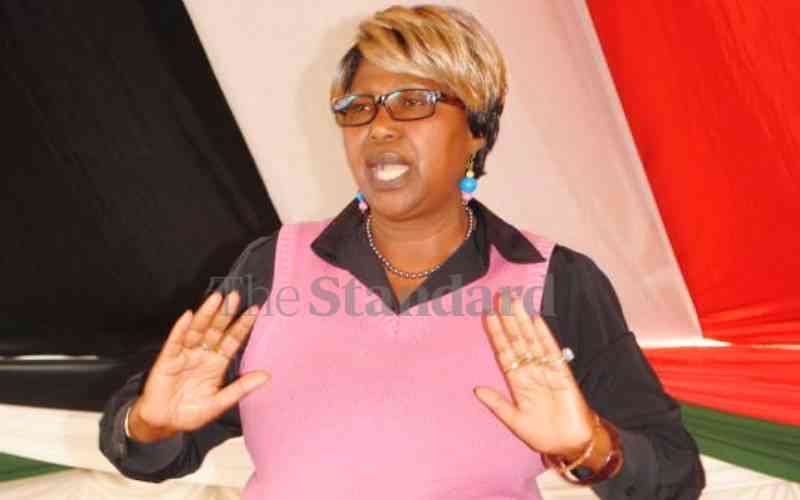File photo by Rodger Bosch / AFP
Three key messages have emerged from the deliberations of Africa’s inaugural climate summit in Nairobi.
Firstly, it is evident that the people of the continent are increasingly anxious to find practical solutions to combat climate change. Second, there is a palpable sense of disappointment among African nations regarding the unmet promises of climate finance by Western and industrialised nations. Thirdly, an intricate interplay between climate change, peace and security is emerging as a major concern demanding comprehensive strategies.
The declaration emanating from this unified African summit on climate is a clear call for a financial framework that aligns with the continent’s unique needs, encompassing debt restructuring and relief. This appeal arises from growing frustration over the exorbitant cost of financing climate initiatives in Africa.
Moreover, it beseeches affluent carbon emitters to uphold their longstanding climate commitments to their less fortunate counterparts and rallies world leaders behind a proposed carbon tax on fossil fuel trade, maritime transport and aviation.
The summit concluded with substantial funding commitments totaling $23 billion, earmarked for promoting green growth and bolstering mitigation and adaptation efforts throughout the African continent. As the world gears up for the COP28 discussions in the United Arab Emirates in November, the stage is set for a clash of visions regarding the global energy landscape.
The Nairobi summit drew an illustrious assembly of heads of state, government officials and industry leaders — including UN Secretary-General Antonio Guterres, EU chief Ursula von der Leyen and US’ climate envoy John Kerry. The gathering was prefigured as an opportunity for African leaders to chart a collective path towards sustainable development on the diverse continent, home to 1.4 billion people.
It also marked the prelude to a flurry of international diplomacy preceding the forthcoming COP28 meeting. However, the continent confronts formidable hurdles, including escalating debt burdens and a paucity of financial resources.
Despite its abundant natural resources, Africa receives a mere 3% of global energy investments, reflecting the pressing need for equitable financing to unlock the continent’s sustainable potential.
African leaders have resoundingly called for extensive reforms within the global financial system. They are rightly imploring the international community to throw its weight behind a significant upswing in renewable energy initiatives. Notably, these leaders emphasise that Africa, while acutely vulnerable to the mounting impacts of climate change, should not be perceived merely as a victim. Instead, it ought to be recognised as an ally in the collective struggle against global warming.
This transformative perspective indicates Africa’s vital role in addressing this shared challenge. The current annual climate assistance of $16 billion to Africa is woefully insufficient, representing only a fraction of what is required and paling in comparison to the budgets of certain polluting corporations.
As expected, the African Climate Summit revolved around two main points — galvanising financial resources to combat the escalating impacts of extreme weather events and finding renewable energy solutions.
The Nairobi Declaration underscored that these measures are pivotal in securing substantial financing for climate-related endeavours while shielding the matter of tax adjustments from the influence of geopolitical and domestic political dynamics. Notably, only a handful of countries, as reported by the International Monetary Fund (IMF), presently levy carbon taxes, with the concept of a global carbon tax regime encountering limited enthusiasm.
African leaders are not merely seeking assistance in the climate change battle; they are also proactively contributing solutions. In this endeavour, it is important to comprehend the role of climate-related issues in exacerbating conflicts and, accordingly, to devise solutions that take this complex interplay into account.
At the same time, the convergence of climate, peace and security requires comprehensive strategies, encompassing vulnerability mitigation, inclusive approaches and climate adaptation with conflict awareness.
The energy transition was a key focus of the summit. Access to energy signifies empowerment, with nearly half of Africa lacking electricity access. A shift to renewables would combat climate change, foster employment and bridge rural-urban divides.
Realising the potential of Africa’s mineral wealth, a third of the world’s reserves including vital resources for renewable and low-carbon technologies like copper, lithium and nickel, hinges on effective governance and skill development within African governments.
Yet, some nations face challenges due to internal strife or state fragility, raising concerns about their capacity to manage these resources responsibly. There’s significant economic promise if these resources are handled judiciously. Negotiating equitable deals with global partners like China or the EU could bring economic benefits to African nations.
However, unchecked exploitation poses grave risks, including environmental degradation, conflict escalation and vulnerability to manipulation by non-state armed actors. Striking a balance is essential for Africa’s sustainable development.
The question of financing Africa’s green energy transition looms large, with climate funding being of utmost importance, especially in fragile environments. However, the continent faces several hurdles in securing these funds. Firstly, there is a glaring deficit in available funds. Wealthier nations were initially expected to provide $100 billion annually in “climate finance” by 2020, a commitment dating back to 2009.
While some argue that this target will be met this year, it is arguably too little and too late.
In reality, the long-term requirement is not in billions but trillions of dollars to catalyse substantial change and sustain Africa’s green journey. The challenge of financing Africa’s green energy transition is significant, particularly in fragile environments where climate funding is essential. Yet, the continent confronts several barriers to accessing these vital resources.
A substantial funding gap exists. Climate finance distribution is profoundly unequal, with conflict-affected nations receiving only a third of per capita funding compared to peaceful counterparts. Closing this gap and providing conflict-sensitive support is vital for peace and stability.
Dr Imran Khalid is a freelance columnist on international affairs based in Karachi, Pakistan.
The views expressed are those of the author and do not necessarily reflect the official policy or position of the Mail & Guardian.




















Discussion about this post